- Home
- Julie Smith
The Axeman's Jazz (Skip Langdon Mystery Series #2) (The Skip Langdon Series)
The Axeman's Jazz (Skip Langdon Mystery Series #2) (The Skip Langdon Series) Read online
“BRILLIANT.” San Francisco Examiner & Chronicle
“A multilayered masterpiece … I read this one on the E train at 5:15 A.M. and didn't look up once…. Julie Smith's New Orleans is a subterranean Mardi Gras where the masks cover smiling sociopaths and even Deadly Nightshade comes sheathed in silk.”
ANDREW VACHSS
“Smith catches New Orleans from blues in the night to beignets at dawn…. The serial killer is currently an all-too-frequent sub-genre of crime fiction, yet it holds its ground because writers like Smith keep finding new dimensions in it.”
Los Angeles Times Book Review
“Smashing … NEW ORLEANS MOURNING was a tough act to follow. THE AXEMAN'S JAZZ is a wonderful, completely satisfying encore.”
The Denver Post
“Well-researched, engaging, with solid psychological insights, this novel is the perfect follow-up to Skip Langdon's NEW ORLEANS MOURNING debut.”
SUE GRAFTON
“OUTSTANDING.” Booklist
THE AXEMAN’S JAZZ IS THE SECOND SKIP LANGDON MYSTERY
The Skip Langdon Series
(in order of publication)
NEW ORLEANS MOURNING (*Edgar-winner for Best Novel)
THE AXEMAN’S JAZZ
JAZZ FUNERAL
DEATH BEFORE FACEBOOK (formerly NEW ORLEANS BEAT)
HOUSE OF BLUES
THE KINDNESS OF STRANGERS
CRESCENT CITY CONNECTION (formerly CRESCENT CITY KILL)
82 DESIRE
MEAN WOMAN BLUES
Also by Julie Smith
The Rebecca Schwartz Series
DEATH TURNS A TRICK
THE SOURDOUGH WARS
TOURIST TRAP
DEAD IN THE WATER
OTHER PEOPLE’S SKELETONS
The Paul Macdonald Series
TRUE-LIFE ADVENTURE
HUCKLEBERRY FIEND
The Talba Wallis Series:
LOUISIANA HOTSHOT
LOUISIANA BIGSHOT
LOUISIANA LAMENT
P.I. ON A HOT TIN ROOF
As Well As:
WRITING YOUR WAY: THE GREAT AMERICAN NOVEL TRACK
NEW ORLEANS NOIR (ed.)
THE AXEMAN’S JAZZ
A Skip Langdon Mystery
By
JULIE SMITH
booksBnimble Publishing
New Orleans, La.
The Axeman’s Jazz
Copyright © 1991 by Julie Smith
eBook ISBN 9781617507212
Cover by Nevada Barr
Originally published by St. Martin’s Press, 175 Fifth Avenue, New York, N.Y. 10010
www.booksbnimble.com
All rights are reserved. No part of this book may be used or reproduced in any manner whatsoever without written permission, except in the case of brief quotations embodied in critical articles and reviews.
First booksBnimble electronic publication: May 2012
Digital editions by eBooks by Barb for booknook.biz
FOR VICKY BIJUR AND CHARLOTTE SHEEDY
Contents
Praise
The Skip Langdon Series
Also by Julie Smith
Title Page
Copyright Page
Dedication
ONE
TWO
THREE
FOUR
FIVE
SIX
SEVEN
EIGHT
NINE
TEN
ELEVEN
TWELVE
THIRTEEN
FOURTEEN
FIFTEEN
SIXTEEN
SEVENTEEN
EIGHTEEN
NINETEEN
TWENTY
TWENTY-ONE
TWENTY-TWO
TWENTY-THREE
TWENTY-FOUR
TWENTY-FIVE
TWENTY-SIX
TWENTY-SEVEN
TWENTY-EIGHT
TWENTY-NINE
THIRTY
THIRTY-ONE
THIRTY-TWO
Acknowledgments
The Skip Langdon Series
Also by Julie Smith
About the Author
ONE
NEW ORLEANS COULD wreck your liver and poison your blood. It could destroy you financially. It could shun you or embrace you, teach you tricks of the heart you thought Tennessee Williams was just kidding about. And in August it could break your spirit.
It was the steady diet of cholesterol and alcohol that got your body, the oil glut that had hit the economy. The weather did the rest. If you could tolerate the heat and the damp, the lightning changes in the atmosphere, indeed, if you took to them, you could get addicted. If you didn’t, you didn’t belong.
If you were one of those who did belong, you could know the fragile sweetness of love on a rainy morning, the feral taste of lust on a stormy afternoon, the randy restlessness that travels through the air with the scent of ozone.
But sometimes in August, when the city had been a sauna for months, when the unmoving air seemed as toxic as that of Pluto, everything seemed to stink and so did everyone. And you couldn’t move.
You couldn’t make a phone call, you couldn’t do your filing, you had no ambition, the simplest chore was too much.
And that was with air conditioning.
Skip Langdon wondered what kind of hellhole the city had been before it was invented.
She had just come back from lunch and her ankles were swollen. Some said it was the salt in the seafood that did it, some said just the heat. She’d noticed it sure as hell didn’t happen in winter.
But no problem. In two days she’d be out of here. A line from an old song—“California Dreamin’”—popped into her head. It was about winter, but it perfectly described her state of mind. In the Crescent City the bad season was summer. Though her head was full of sea breezes instead of smog, at the moment even L.A. in a smog alert seemed preferable to New Orleans in August. And Skip had a tolerance for the heat, almost liked it.
She was aware that the fact that she’d be seeing her friend Steve Steinman probably played no small part in her wanderlust. She’d met him here at Mardi Gras and hadn’t seen him since. Would he be different on his own turf? Did he live in a sterile condo or a funky old house? (Whatever it was, it couldn’t be any worse than her studio on St. Philip Street.) Was he a good housekeeper? (She hated a man who wasn’t.)
Was she really in love with him, or had they just gotten caught up in the moment? She felt absurdly adolescent about this vacation.
Or at any rate, she supposed she did. She hadn’t dated in high school, had been too tall, too fat, too confused, and probably, to the other kids, too weird. Of course she’d been to Miggy’s and Icebreakers, sixth-grade dancing school and seventh-grade subscription dances—every McGehee’s girl had. But the “normal” course of events hadn’t materialized.
She smiled—rather nastily—as she imagined how much that must have chagrined her social-climbing parents. It had so chagrined her at the time she hadn’t noticed the neat revenge in it. But in the end, they’d won—they’d worn her down to the point she’d agreed to make her debut. If they’d known she’d end up a cop, they probably would have saved their money.
The phone jangled her out of her reverie and she saw that she’d doodled a pathetic paraphrase, “August is the cruelest month,” without realizing it.
“Langdon. Homicide.”
She might be semi-conscious, but she wasn’t dead yet. It still gave her a thrill to say that, to listen to herself proclaiming what she was, to feel she’
d made it in her hometown. Informally, she was a detective now, and she had been for a month. Technically, she was still a patrol officer, since “detective” wasn’t a rank in the New Orleans department, just a description.
At Mardi Gras, she’d been a rookie walking a beat (literally walking—VCD, the Vieux Carré District, was the only walking beat in town). A week later she’d almost resigned—and now here she was in Homicide. She still only half believed it.
It was the desk officer on the phone. Some French Quarter apartment manager had had some kind of crazy suspicion about one of his tenants. Two guys from VCD had responded and found a body.
That was bad. She was the only one in the office and her vacation started in two days. Her sergeant, Sylvia Cappello, had tried not to get her in too deep before she left—most homicides that weren’t solved in the first week didn’t get solved—but it looked as if the plan might have backfired.
It was an old building, poorly kept, the real-estate market being so soft no one could afford to fix anything up.
One of the VCD guys was smoking out front, making Skip long momentarily for her uniform. (She’d had to buy clothes for her transfer, having had hardly a rag in her closet before it came through.) At the moment, she was wearing a basic-black skirt—she’d bought three of them—with a beige silk blouse and a pair of flats. She had had the courage not to wear heels, but a rare moment of social insight had suggested she really couldn’t skip pantyhose. So at the moment her legs felt like sweaty sausages.
“Hi, I’m Langdon.”
The uniform smiled. He was cute. “Apartment four.”
She hoped to God the AC was on.
A man called down the stairwell, “Are you a friend of Linda Lee’s?”
She shook her head, tried to look friendly as the old guy came into view. “I’m from Homicide.” She showed her badge.
He looked nearly eighty, thin, with shrunken shoulders. He frowned, but not so much, she thought, with displeasure as with the fear of giving it. He reminded her of her grandfather, her father’s father back in Mississippi.
He extended his hand. “Curtis Ogletree. I’m the manager. Thought you might want to talk to me.”
“Thanks. In a minute I’ll knock on your door if I may— I’ll just have a look first.”
“I better go in with you.”
“That’s okay. I can handle it.”
But he tried to follow her. A true Southern man, she thought, determined to do his duty no matter how unpleasant for himself, how inconvenient for others. By God, he was going to be helpful. Her grandfather had driven her nuts, actually removing her paper dolls from her tiny hands, cutting the clothes out himself, never understanding why she screamed in rage and frustration.
Who knew what Curtis Ogletree felt responsible for? Perhaps he didn’t think he should leave the owner’s property unattended; more likely, he was trying to be gallant, to protect a lady about to be in distress. Perhaps he thought he’d catch her if she fainted. The corners of her mouth twitched even as she soothed and shooed him—he was about five feet nine, 140 pounds; she was six feet tall and didn’t tell her weight.
She sighed, closing the door of the woman’s apartment. Linda Lee, Ogletree had called her, but Skip didn’t know if it was a first and last name or two firsts. Instantly, her gorge rose. Yes, the air conditioner was on, had probably been on for days, but Linda Lee hadn’t died today or even yesterday. Skip clapped a tissue over her mouth and nose. Her eyes watered. The door opened behind her, the cute officer’s partner arriving, a guy with a beer gut.
“Pretty bad, huh?”
“Why don’t you wait outside?”
He shot her a grateful look, and she hoped he’d remember one day when she needed a favor.
She drew close to Linda Lee (if that was her name), a white female adult. Very white indeed. Short hairdo, almost prim. Not much makeup. Her neck had what might be bruises on it, but they were faint, possibly due to lividity. Purge, or white froth, had come out of her mouth and nose. There was no blood, no wounds that Skip could see, and there was nothing around her neck. But there were those marks, as if she’d been strangled. Strangled bare-handed.
She was wearing olive-drab baggy pants and a shirt open over a tank top, as if she were going out at night, expecting a cool breeze off the river. Or perhaps, Skip thought, she had chubby arms and she was self-conscious about them. A small, fashionable black bag was still slung over her shoulder, crossing her chest in mugger-foiling mode. More evidence that she was going out—or she’d already been.
Had she opened the door to her boyfriend, had they fought? Had he arrived with a snootful, to accuse her of cheating on him? Or had she been out and come home with someone who’d strangled her?
Either way, the bag was chilling, struck a perfunctory note that gave Skip goose bumps. No preamble, no foreplay. No signs of a struggle. Just murder. Skip looked at Linda Lee’s hands. Surely she had fought her attacker. There would be skin under the nails.
Skip didn’t see any. Maybe Linda Lee hadn’t thought to scratch, had only grabbed and pulled.
She lay nearly underneath a table just inside the living room. On the table was a lamp, a tray for mail, and a neat pile of books. On the wall above the table was a red A, written in what looked like lipstick.
Skip looked around the room—ordinary furniture, on the cheap side; posters tacked to the walls and one old-fashioned landscape, maybe painted by a relative or bought at a garage sale. Nothing special here, but the room was neat and looked cared for. Not the room of a crazy artist, an out-of-it alcoholic, or an obviously disturbed person—not even the room of a free spirit. Not the room of a person who painted on her wall with lipstick.
Why A? And why lipstick? To simulate blood? Was it intended to be a scarlet A with the same meaning as the original? Skip dismissed the idea as preposterous. She hadn’t been in Homicide long, but already she found it inconceivable that anyone would make a literary allusion in the midst of snuffing someone. Still, a jealous lover…
It was a weird town and the Quarter was plain wacko.
Technically, the victim had to be declared dead before any homicide investigation could start, and then the crime lab had to go over the place and photograph it. But Skip took a cursory look around the apartment. There was only a bedroom and kitchen, both neat, the bed made up, no dishes in the sink. Seemingly nothing out of place. Excellent. Maybe there’d be a calendar someplace with the names of recent dates, maybe letters from a rejected lover.
Skip left the two district officers to wait for the crime lab and went up to see Curtis Ogletree. Green plush overstuffed chairs and sofa shared space with small tables stained a reddish color, possibly to simulate maple. One of the tables had a magazine rack built into it, and one side of the magazine rack was a fake wagon wheel, spokes and all. The furniture seemed nearly as old as he was, or half as old anyway, which would have made it about forty, but it was in perfect condition. Mr. Ogletree had put down a tan rug.
It was a comfortable, masculine room, one in which Skip imagined Mr. Ogletree spent most of his time. “I’ve got coffee on,” he said.
Coffee! It must be ninety-eight in the shade.
“Great,” she said. “I’d love some.” She noticed his hands shook as he handed her a cup, and felt a sudden wave of sympathy.
“I’m sorry you had to go through this.”
He waved impatiently, shooing the sentiment, his frown growing deeper. “Please. It’s my job.”
If he’s the murderer, no problem. The more he frowns, the more he’s lying.
But she knew she was playing mind games with herself; he would probably lie only about how easy it was to do something hard—especially something for someone else, at great inconvenience to himself.
He looked a wreck. His face was drawn, probably with the effort of concealing the loathing and horror he felt.
Maybe it would help him to talk about it.
“Most people don’t see dead bodies except lying in cof
fins in their Sunday clothes. I know it was a shock for me the first time—and it never really got any easier.”
His frown was so fierce she wondered if he was going to hit her. His words and voice were gentle: “I guess it’s different for men.”
She was making things worse.
She took out her notebook, crossed her legs, leaned back, and pretended to give him an appraising look, ever-so-slightly suspicious. She made her voice crisp: “How did you happen to discover the body?”
“A lady from her office came—Lucy McKinnon. I have her number; would you like it?”
“Please.”
He rummaged in a pocket and handed over the number. “She said Linda Lee hadn’t showed up for work Friday or today and didn’t answer her phone or her doorbell. Wanted to know if she’d moved out. I said no, but I’d let her know if I found out anything—that’s why she gave me the phone number.

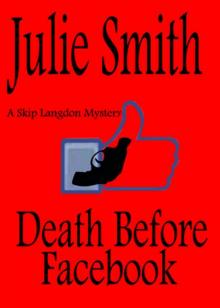 Death Before Facebook (Skip Langdon #4) (Skip Langdon Mystery) (The Skip Langdon Series)
Death Before Facebook (Skip Langdon #4) (Skip Langdon Mystery) (The Skip Langdon Series) P.I. On A Hot Tin Roof
P.I. On A Hot Tin Roof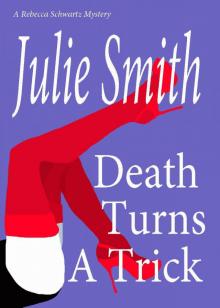 Death Turns A Trick (Rebecca Schwartz #1) (A Rebecca Schwartz Mystery) (The Rebecca Schwartz Series)
Death Turns A Trick (Rebecca Schwartz #1) (A Rebecca Schwartz Mystery) (The Rebecca Schwartz Series) The Axeman's Jazz (Skip Langdon Mystery Series #2) (The Skip Langdon Series)
The Axeman's Jazz (Skip Langdon Mystery Series #2) (The Skip Langdon Series)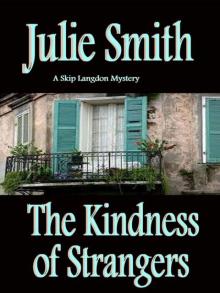 The Kindness of Strangers (Skip Langdon Mystery #6) (The Skip Langdon Series)
The Kindness of Strangers (Skip Langdon Mystery #6) (The Skip Langdon Series) Louisiana Hotshot
Louisiana Hotshot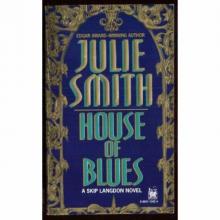 House of Blues
House of Blues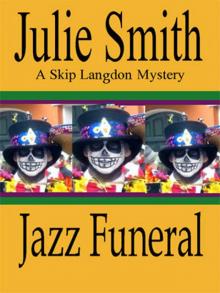 Jazz Funeral (Skip Langdon #3) (Skip Langdon Mystery) (The Skip Langdon Series)
Jazz Funeral (Skip Langdon #3) (Skip Langdon Mystery) (The Skip Langdon Series) Tourist Trap (Rebecca Schwartz #3) (A Rebecca Schwartz Mystery) (The Rebecca Schwartz Series)
Tourist Trap (Rebecca Schwartz #3) (A Rebecca Schwartz Mystery) (The Rebecca Schwartz Series)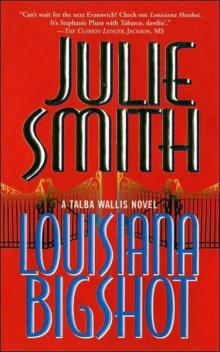 Louisiana Bigshot
Louisiana Bigshot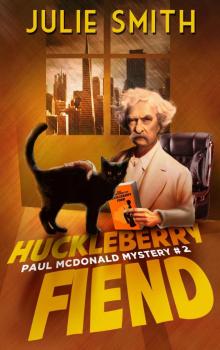 Huckleberry Fiend
Huckleberry Fiend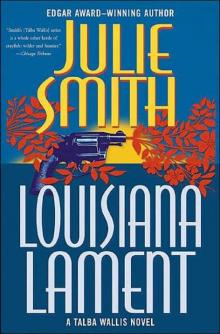 Louisiana Lament
Louisiana Lament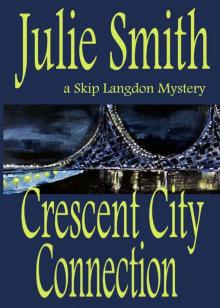 Crescent City Connection (Skip Langdon Mystery #7) (The Skip Langdon Series)
Crescent City Connection (Skip Langdon Mystery #7) (The Skip Langdon Series)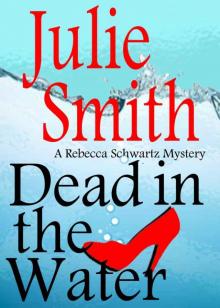 Dead In The Water (Rebecca Schwartz Mystery #4) (The Rebecca Schwartz Series)
Dead In The Water (Rebecca Schwartz Mystery #4) (The Rebecca Schwartz Series) True-Life Adventure
True-Life Adventure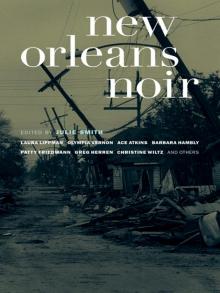 New Orleans Noir
New Orleans Noir